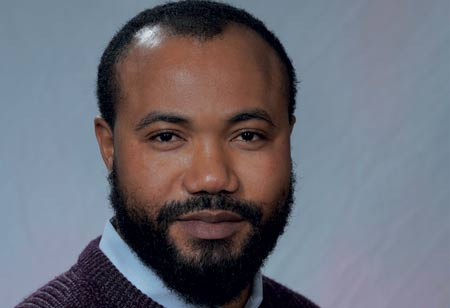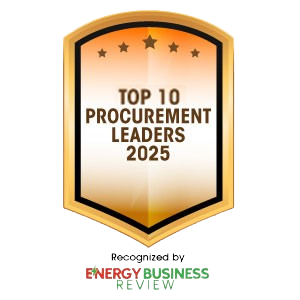In an interview with Energy Business Review, Mr. Gabriel Asiunukegbe, Director of Procurement at Global Partners, shares his insights on the significance of maintaining cordial supplier relations, efficient processes and an open mind to excel in the procurement industry.
Gabriel Asiunukegbe is a seasoned Supply Chain professional with expertise in logistics management and procurement. An active member of the American Purchasing Society, he is noted for his adept at facilitating vendor and client relationships and leveraging cutting-edge supply chain strategies to ensure project efficiency. Gabriel’s experience spans many industries, focusing on crossfunctional team management, procurement and strategic contract management. His previous roles have taken him through companies like Vendoral Multiventures Concept Limited, Encore Boston Harbor, HPN Select and Buyers Access, leading to his current role at Global Partners.
A Journey Spanning Continents and Industries .
My journey started in 2008 during my college years, when I worked part-time in the warehouse of my uncle’s energy company in Nigeria. His company focused on bringing electricity to rural Nigerian villages. I started as a warehouse worker and was eventually promoted to a managerial position.
I continued in this position until 2016 when I moved to the U.S. for a master’s in project management to gain deeper insights into project dynamics beyond procurement and supply chain. Following the master’s, I earned an advanced diploma in supply chain management from Northeastern University. My career has spanned various industries like hospitality and manufacturing, including a significant time in consulting. Each role, from warehouse dispatcher to senior manager, has contributed to my current position. The journey culminated in Global Partners, where I was promoted to director within a year and a half of joining.
The Global Partners Approach
In our company, the approach to purchasing is quite complex and varies depending on the project and team involved. We adhere to strict procedural guidelines but remain flexible in modifying our strategy when necessary. But regardless of the method, we always stay compliant and ensure superior quality.
It is imperative to maintain clear communication and efficient processes from the initial requirement setting to the final delivery, ensuring compliance and quality throughout.
Our focus is also on maintaining excellent supplier relationships, which is crucial in the dynamic energy sector where approaches vary with the technology concerned, like in the recent transition to renewable energy. This involves a solid goal and consistent communication, ensuring we get the best quality materials on time and at reasonable prices. A strong supplier relationship makes the entire procurement process smoother and more efficient.
The People-Centric Approach to Efficiency
Our process starts by identifying project needs, as the ones we handle often involve big-ticket investments. Project and field managers brainstorm to narrow down essential requirements, aligning them with business goals. Next, we identify the bestsuited suppliers, achieving agreement across cross-functional teams and securing executive buy-in. I also work with accounts payable to reconcile the final phase.
It is imperative to maintain clear communication and efficient processes from the initial requirement setting to the final delivery, ensuring compliance and quality throughout. The key to an optimized procurement process, again, is maintaining good relationships with both the internal teams in your organization and the suppliers.
Excellence is a Journey
My approach to procurement has been shaped by lessons learned from diverse work experiences. From warehouse dispatcher to managerial roles, each position has deepened my understanding and refined my procurement strategy. One notable project was consulting for a pharmaceutical company in Rhode Island on a $2.5 billion plant construction. This involved detailed work on the bill of materials and compliance with FDA regulations. Learning from different perspectives and experiences has been crucial. Each position, whether small or great, has provided valuable lessons that I apply in my current role.
Excellence in procurement is a journey rather than a destination.
The Brave New Energy Industry
Several emerging technologies hold transformative potential in the energy sector. Harnessing renewable energy sources like the sea and the sun is vital for progress. Advanced nuclear reactors, including small modular reactors and advanced fission reactors, also promise safer, more efficient and potentially cheaper nuclear power. The Internet of Things (IoT) and artificial intelligence (AI) are at the forefront, offering greater sustainability and efficiency. The rise of electric vehicles and advancements in renewable technologies like solar PVs is also significant in pushing the sector towards further efficiency.
I’m currently studying various technologies to leverage them to gain an edge in pursuing new business opportunities and adapting to evolving business models. Embracing these innovations is crucial for staying ahead in the evolving energy landscape.
Businesses must proactively address market trends and embrace new opportunities and challenges. Many organizations struggle with this adaptation, often failing to integrate new technologies effectively. The critical challenge is to be open to adopt new technologies and adapt business practices accordingly. Embracing these technologies and remaining flexible is essential for capitalizing on emerging opportunities.
An Open Mind for an Exceptional Journey
The most important thing is being open to new ideas and their challenges. It’s essential not to stick rigidly to old methods but to be flexible and open-minded. Embrace new challenges and avoid getting too comfortable. Valuable insights can come from unexpected sources, so listen to everyone, whether it’s engineers, front desk staff, or the janitors. You can’t know everything, so embrace a continuous desire for learning, both formal and informal. Formal learning involves studying new technologies, while informal learning involves engaging with colleagues and gathering information through direct interactions.
Most importantly, stay true to yourself while being open to learning and expecting valuable contributions from the least expected sources. This approach is particularly useful for aspiring professionals in the energy sector.




